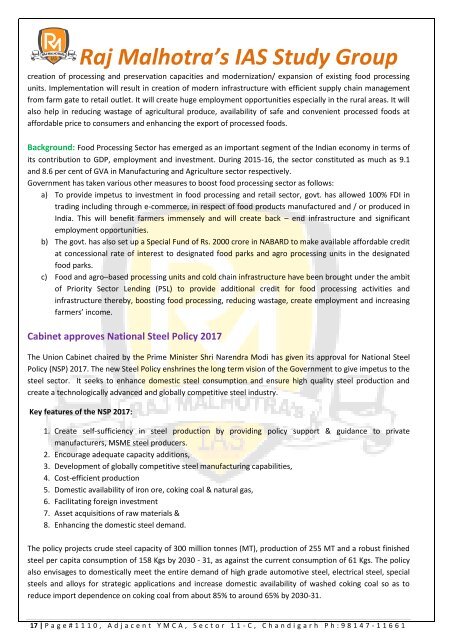Hard Facts 05 2017 (May)
Create successful ePaper yourself
Turn your PDF publications into a flip-book with our unique Google optimized e-Paper software.
Raj Malhotra’s IAS Study Group<br />
creation of processing and preservation capacities and modernization/ expansion of existing food processing<br />
units. Implementation will result in creation of modern infrastructure with efficient supply chain management<br />
from farm gate to retail outlet. It will create huge employment opportunities especially in the rural areas. It will<br />
also help in reducing wastage of agricultural produce, availability of safe and convenient processed foods at<br />
affordable price to consumers and enhancing the export of processed foods.<br />
Background: Food Processing Sector has emerged as an important segment of the Indian economy in terms of<br />
its contribution to GDP, employment and investment. During 2015-16, the sector constituted as much as 9.1<br />
and 8.6 per cent of GVA in Manufacturing and Agriculture sector respectively.<br />
Government has taken various other measures to boost food processing sector as follows:<br />
a) To provide impetus to investment in food processing and retail sector, govt. has allowed 100% FDI in<br />
trading including through e-commerce, in respect of food products manufactured and / or produced in<br />
India. This will benefit farmers immensely and will create back – end infrastructure and significant<br />
employment opportunities.<br />
b) The govt. has also set up a Special Fund of Rs. 2000 crore in NABARD to make available affordable credit<br />
at concessional rate of interest to designated food parks and agro processing units in the designated<br />
food parks.<br />
c) Food and agro–based processing units and cold chain infrastructure have been brought under the ambit<br />
of Priority Sector Lending (PSL) to provide additional credit for food processing activities and<br />
infrastructure thereby, boosting food processing, reducing wastage, create employment and increasing<br />
farmers’ income.<br />
Cabinet approves National Steel Policy <strong>2017</strong><br />
The Union Cabinet chaired by the Prime Minister Shri Narendra Modi has given its approval for National Steel<br />
Policy (NSP) <strong>2017</strong>. The new Steel Policy enshrines the long term vision of the Government to give impetus to the<br />
steel sector. It seeks to enhance domestic steel consumption and ensure high quality steel production and<br />
create a technologically advanced and globally competitive steel industry.<br />
Key features of the NSP <strong>2017</strong>:<br />
1. Create self-sufficiency in steel production by providing policy support & guidance to private<br />
manufacturers, MSME steel producers.<br />
2. Encourage adequate capacity additions,<br />
3. Development of globally competitive steel manufacturing capabilities,<br />
4. Cost-efficient production<br />
5. Domestic availability of iron ore, coking coal & natural gas,<br />
6. Facilitating foreign investment<br />
7. Asset acquisitions of raw materials &<br />
8. Enhancing the domestic steel demand.<br />
The policy projects crude steel capacity of 300 million tonnes (MT), production of 255 MT and a robust finished<br />
steel per capita consumption of 158 Kgs by 2030 - 31, as against the current consumption of 61 Kgs. The policy<br />
also envisages to domestically meet the entire demand of high grade automotive steel, electrical steel, special<br />
steels and alloys for strategic applications and increase domestic availability of washed coking coal so as to<br />
reduce import dependence on coking coal from about 85% to around 65% by 2030-31.<br />
17 | P a g e # 1 1 1 0 , A d j a c e n t Y M C A , S e c t o r 1 1 - C , C h a n d i g a r h P h : 9 8 1 4 7 - 1 1 6 6 1





